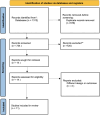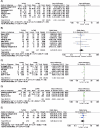Quality of life and functional outcomes after laparoscopic total mesorectal excision (LaTME) and transanal total mesorectal excision (taTME) for rectal cancer. an updated meta-analysis
- PMID: 39120642
- PMCID: PMC11315702
- DOI: 10.1007/s00384-024-04703-x
Quality of life and functional outcomes after laparoscopic total mesorectal excision (LaTME) and transanal total mesorectal excision (taTME) for rectal cancer. an updated meta-analysis
Abstract
Purpose: Concerns exist regarding the potential for transanal total mesorectal excision (TaTME) to yield poorer functional outcomes compared to laparoscopic TME (LaTME). The aim of this study is to assess the functional outcomes following taTME and LaTME, focusing on bowel, anorectal, and urogenital disorders and their impact on the patient's QoL.
Methods: A systematic review was performed according to the Preferred Reporting Items for Systematic Reviews and Meta-Analyses (PRISMA) guidelines and A Measurement Tool to Assess systematic Reviews (AMSTAR) guidelines. A comprehensive search was conducted in Medline, Embase, Scopus, and Cochrane Library databases. The variables considered are: Low Anterior Resection Syndrome (LARS), International Prostate Symptom Score (IPSS) and Jorge-Wexner scales; European Organisation for Research and Treatment of Cancer (EORTC) QLQ-C29 and QLQ-C30 scales.
Results: Eleven studies involving 1020 patients (497-taTME group/ 523-LaTME group) were included. There was no significant difference between the treatments in terms of anorectal function: LARS (MD: 2.81, 95% CI: - 2.45-8.08, p = 0.3; I2 = 97%); Jorge-Wexner scale (MD: -1.3, 95% CI: -3.22-0.62, p = 0.19). EORTC QLQ C30/29 scores were similar between the groups. No significant differences were reported in terms of urogenital function: IPSS (MD: 0.0, 95% CI: - 1.49-1.49, p = 0.99; I2 = 72%).
Conclusions: This review supports previous findings indicating that functional outcomes and QoL are similar for rectal cancer patients who underwent taTME or LaTME. Further research is needed to confirm these findings and understand the long-term impact of the functional sequelae of these surgical approaches.
Keywords: Functional outcomes; Laparoscopic TME; Meta-analysis; Quality of Life; Rectal cancer; Transanal TME.
© 2024. The Author(s).
Conflict of interest statement
The authors declare no competing interests.
Figures


References
-
- You YN, Hardiman KM, Bafford A, Poylin V, Francone TD, Davis K, Paquette IM, Steele SR, Feingold DL (2020) The American Society of Colon and Rectal Surgeons Clinical Practice Guidelines for the Management of Rectal Cancer. Dis Colon Rectum 63:1191–1222. 10.1097/DCR.0000000000001762 - PubMed
-
- Penna M, Buchs NC, Bloemendaal AL, Hompes R (2016) Transanal Total Mesorectal Excision for Rectal Cancer: The Journey towards a New Technique and Its Current Status. Expert Rev Anticancer Ther 16:1145–1153. 10.1080/14737140.2016.1240040 - PubMed
-
- Sylla P, Rattner DW, Delgado S, Lacy AM (2010) NOTES Transanal Rectal Cancer Resection Using Transanal Endoscopic Microsurgery and Laparoscopic Assistance. Surg Endosc 24:1205–1210. 10.1007/s00464-010-0965-6 - PubMed
-
- Vignali A, Elmore U, Milone M, Rosati R (2019) Transanal Total Mesorectal Excision (TaTME): Current Status and Future Perspectives. Updat Surg 71:29–37. 10.1007/s13304-019-00630-7 - PubMed

